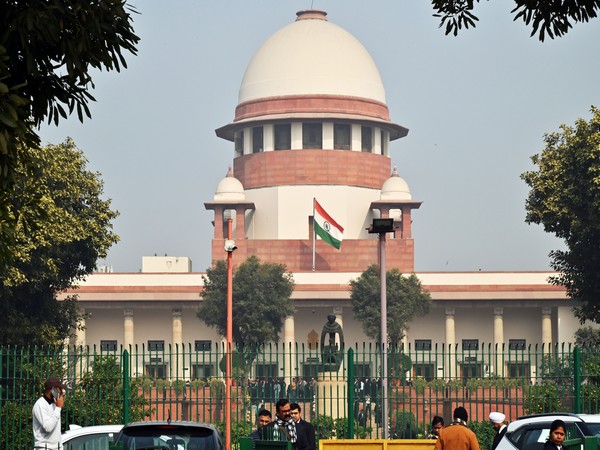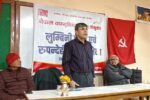NEW DELHI, INDIA: Even though the Supreme Court has refused to give marriage equality rights to the LGBTQIA+ community noting that conferring legal status to civil union can only be through a law enacted by Parliament, petitioners and rights activists, though disappointed, were of the view that the verdict had many observations that were in their favor.
“It is with bated breath that everyone has waited for the same-sex marriage judgment and I am so happy to see that in the judgment of the Chief Justice the Chief Justice has in fact said the same bundle of rights which every married couple has should be available to the same-sex couple,” said senior advocate Geeta Luthra, who appeared for some of the petitioners in the marriage equality case, whose ruling was pronounced by the apex court today.
Another petitioner Harish Iyer, who is an LGBTQIA+ rights activist, said, “Though at the end, the verdict was not in our favour so many observations (by Supreme Court) made were in our favour. They have also put the responsibility on Central govt and Central govt’s Solicitor General…”
“(Now) it is important for us to go to our elected government, MPs and MLAs and tell them we are as different as two people. War is underway…it might take some time but we will get societal equality,” Iyer added.
One of the other petitioners and activist Anjali Gopalan said she was disappointed with the same-sex marriage equality verdict, but what was crucial was that the legality of marriage of members from the trans community was clarified.
“The only good thing, and I think at least for the trans community, there’s clarity, which is a good thing that’s happened, and also the definition of discrimination has been expanded and clarified, which is also a good thing that’s happened,” Gopalan said.
She contended she was not expecting that full marriage rights would happen so quickly, but definitely was expecting a lot more on civil unions and civil rights.
“And that would have been good. It would have been a step forward. But it’s really unfortunate that that has not happened,” Gopalan said.
Ankit Bhuptani, founder of Queer Hindu Alliance and a rights activist, said the overall judgment is quite progressive and positive because the apex court talked about so many rights that they were demanding.
“For example, the Court talked about anti-discrimination at home by parents. The court also talked about banning conversion therapy for LGBT people. That is something which we have been demanding for a very long time. It also talked about shelter homes for LGBT people who are thrown out of their homes. So, so many small, small positive things were there. It also talked about recognition of marriage for transgender people because they fall under the gender binary conversation,” Bhuptani said.
“However, what we as a community feel a little disappointed about today is that it did not recognize the right of marriage or even civil partnership for gays and lesbians, and have asked the center to form a committee that will look into it.
So it’s a mixed judgment. So many small, small positives. But that which was the core of the judgment, was a little disappointing because gays and lesbians did not get the right to their civil partnership. Yes, we are with our transgender folks who have all the rights they demand. So we are celebrating their victory today. However, it is not a full victory because not a full celebration, because yet we have not got that,” Bhuptani added.
Earlier today, a five-judge Supreme Court Constitution bench in a 3:2 majority verdict ruled that for LGBTQIA+ couples there is no unqualified right to marriage and noted that conferring legal status to civil union can only be through enacted law.
The bench comprising Chief Justice of India DY Chandrachud, Justices Sanjay Kishan Kaul, S Ravindra Bhat, Hima Kohli, and PS Narasimha delivered the verdict it had reserved on May 11 this year.
The court, however, said the judgment will not preclude the right of Queer persons to enter into relationships. The apex court also said that the challenge to the Special Marriage Act (SMA) on the ground of under-classification is not made out.
Justice Ravindra Bhat, Justice Narasimha, and Justice Hima Kohli were in agreement on these positions, while CJI Chandrachud and Justice Sanjay Kishan Kaul took divergent positions.
In his majority judgment, Justice Bhat said the Court can not put the State under any obligation when there is no constitutional right to marry or legal recognition of unions among non-heterosexual couples. Justice Bhat said the Court cannot create a legal framework for queer couples and it is for the legislature to do as there are several aspects to be taken into consideration. All queer persons have the right to choose their partners but State cannot be obligated to recognize the bouquet of rights flowing from such a union.
In his conclusion, Justice Bhat said there is no unqualified right to marriage. Conferring legal status to the civil union can only be through enacted law. But these findings will not preclude the right of queer persons to enter into relationships.
The five-judge Constitution bench was dealing with a batch of petitions pertaining to marriage equality rights for the LGBTQIA+ community. The order was reserved on May 11 after counsels from all sides concluded their arguments.
(ANI)









Comment